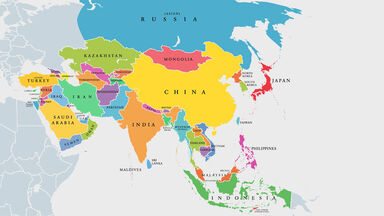The most famous Arsaces was the chief of the Parni, one of the nomadic Scythian or Dahan tribes in the desert east of the Caspian Sea.
Its geographical range was formerly very extensive, and included Great Britain, France, the Netherlands, Switzerland, Germany, Bohemia, Hungary, Poland, Transylvania, Galicia, the Caucasus as far as the Caspian, southern Russia, Italy, Spain, Greece, Rumania, Bulgaria, Servia, and portions of central and northern Asia.
It was an exciting chase of king by king, in which each covered the ground by incredible exertions, shedding their slower-going followers as they went, past Rhagae (Rai) and the Caspian gates, till early one morning Alexander came in sight of the broken train which still clung to the fallen king.
The pursuit had brought Alexander into that region of mountains to the south of the Caspian which connects western Iran with the provinces to the east of the great central desert.
Finally, at Jorjan, near the Caspian, he met with a friend, who bought near his own house a dwelling in which Avicenna lectured on logic and astronomy.

